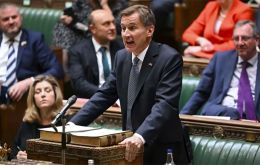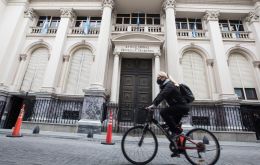MercoPress. South Atlantic News Agency
Tag: recession
-
Wednesday, August 9th 2023 - 09:43 UTC
German economy in recession: industrial output down 1,5% in June

Germany's industrial output fell for a second consecutive month in June, figures published this week show, with a drop of 1.5% far wider than the previous month's slip of 0.1%.
-
Wednesday, March 22nd 2023 - 10:35 UTC
Crucial week for the Fed's Powell and the US banking system

Several banking failures in the US this month have raised fears about the health of the financial system. The collapses follow a sharp rise in global borrowing costs, led by the US, which has shocked the world economy and raised worries about a painful downturn known as a recession.
-
Monday, March 20th 2023 - 16:05 UTC
Network of leading Western central banks ready to inject the necessary dollars liquidity

Leading central banks of the West announced on Sunday a coordinated action to provide liquidity to the financial system through the US swap liquidity line arrangements. The statement was signed by Secretary of the Treasury Janet L. Yellen and Federal Reserve Board Chair Jerome H. Powell and becomes effective Monday 20 March.
-
Friday, November 18th 2022 - 09:23 UTC
UK in recession; Autumn plan anticipates £30 billion in spending cuts and £25 billion in tax hikes.

Chancellor of the Exchequer Jeremy Hunt announced on Thursday a £55 billion fiscal plan with £30 billion in spending cuts and £25 billion in tax hikes. The measures which anticipate a cold winter and long recession in the UK, included an extra two-year freeze on income tax thresholds and a lowering of the top rate of income tax to £125,140
-
Tuesday, September 20th 2022 - 09:15 UTC
German recession forecasted to begin in the last quarter, Bundesbank report
“The signs of a recession of the German economy are multiplying,” reads the monthly report from the country's central bank, Bundesbank, adding “a slump that could last into next year”.
-
Wednesday, July 27th 2022 - 09:17 UTC
Ample majority of US population feel the country is already in recession

United States public opinion is turning its back on president Joe Biden's administration since over three quarters believe is doing a poor job in handling the US economy according to a CNN/SSRS poll.
-
Thursday, March 4th 2021 - 09:24 UTC
Argentina's banks face a tough year: bad loans, inflation and regulations

Rising inflation plus bad loans and government regulations anticipate a tough 2021 according to the CEO of Argentina's biggest private bank by market capitalization. “If inflation is high, there is a risk that bank results will fall to very low or negative levels in real terms,” Fabian Kon said in an interview in Buenos Aires.
-
Thursday, January 14th 2021 - 09:00 UTC
Ruling coalition in Italy loses majority in the midst of the worst recession since WW2

Italy's former premier Matteo Renzi pulled his small party out of government on Wednesday, stripping the ruling coalition of its parliamentary majority and triggering political chaos even as the nation battles a resurgent COVID-19.
-
Thursday, November 26th 2020 - 09:30 UTC
Fitch Ratings more optimistic about Latin America's “improving economic” environment

Latin American corporate credit indicators point to an improving economic and operating environment for most countries across the region in 2021, according to a series of new reports from Fitch Ratings.
-
Wednesday, November 25th 2020 - 09:06 UTC
Brazil on track to end recession early 2021, as private activity speeds up

Brazil’s economy probably rebounded at a record quarterly pace in July-September and was on track for a better start to 2021 than previously thought, as businesses and households recovered from the first surge in COVID-19 cases.
